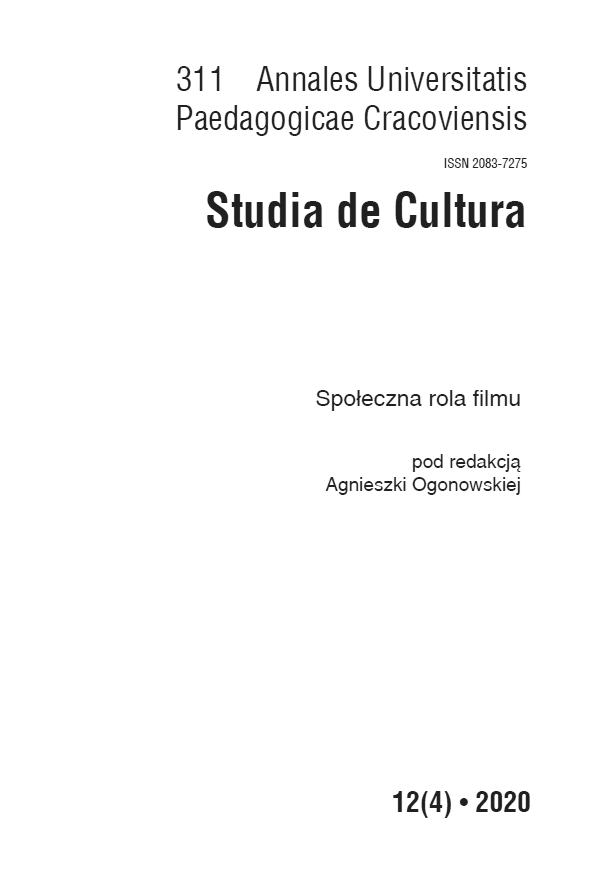Abstract
The main purpose of this paper is to determine the most frequently used propaganda forms of expression in the film Triumph of the Will by Leni Riefenstahl. This research target may be presented in the form of the following questions: Which propaganda forms of expression have been used in the film? Which symbols have been used to convey the message in Leni Riefenstahl’s film? The answers to these questions will be interpreted in the context of Stewart M. Hoover’s theory “from medium to meaning.” Its author paid attention to the essential question: To what extent do media convey meaning? To what extent do they give meaning to a phenomenon? Analogically, a question may be asked, with reference to Riefenstahl’s film: to what extent her film might have given meaning to the Nazi propaganda? What was the role of cinema in Adolf Hitler’s policy and in popularising his views? The article is a review paper. Its indirect goal is to draw attention to the transfer of meaning in audiovisual communication.
References
Dobek-Ostrowska Bogusława. 2007. Komunikowanie polityczne i publiczne. Warszawa.
Dobek-Ostrowska Bogusława, Fras Janina, Ociepka Beata. 1997. Teoria i praktyka propagandy. Wrocław.
Dobrzyński Przemysław. 2019. YouTube usuwa „Triumf woli” w ramach walki z mową nienawiści. To film zrealizowany na zlecenie Adolfa Hitlera. https://www.spidersweb.pl/ rozrywka/2019/06/07/ youtube-usuwa-triumf- woli-riefenstahl-adolf-hitler/. (dostęp: 12.03.2020).
Hinton B. David. 2012. „Triumph of the Will: Document or Artifice?”. Cinema Journal t. 15/1. 48-57.
Hoover Stewart M. 1998. Religion in the News: Faith and Journalism in American Public Discourse. London - New York.
Hoover Stewart M. 2006. Religion in the Media Age. London - New York.
Hoover Stewart M., Park Jin Kyu. 2020. Religion and Meaning in the Digital Age. W: Belief in Media Cultural Perspectives on Media and Christianity. Mary E. Hess (red.). New York. 121-136.
Iłowiecki Maciej. 2003. Krzywe zwierciadło. O manipulacji w mediach. Lublin.
Kołodziej Jacek. 2006. Propaganda. W: Słownik terminologii medialnej. Walery Pisarek (red.). Kraków. 164-166.
Laskowska Małgorzata, Marcyński Krzysztof. 2019. „Media ecology - (un)necessary research perspective in media studies”. Mediatization Studies 3. 53-68.
Marcyński Krzysztof. 2016. Komunikacja religijna i media. Kraków.
Marcyński Krzysztof. 2017. Kompetencja komunikacyjna. Studium medioznawcze. Warszawa.
McLuhan Marshall, Fiore Quentin. 1996. The Medium Is the Massage. An Inventory of Effects. San Francisco.
Narożna Dominika, Jeż Aleksandra. 2017. „Kreowanie rzeczywistości w filmach dokumentalnych. Kazus Leni (Helene Amalie Berthy) Riefenstahl na podstawie produkcji Triumf woli i Olympia”. Świat Idei i Polityki t. 16. 105-121.
Nowak Katarzyna. 2015. Ideologia zamknięta w kadrze. „Triumf woli” Leni Riefenstahl. https://histmag.org/ Ideologia-zamknieta-w-kadrze.-Triumf-woli-Leni-Riefen-stahl-3959. (dostęp: 12.02.2020).
Przylipiak Mirosław. 2004. Poetyka kina dokumentalnego. Gdańsk - Słupsk.
Radkiewicz Małgorzata. 2010. Propagandowy film. W: Słownik filmu. Rafał Syska (red.). Kraków. http://www.akademiapolskiegofilmu.pl/pl/historia-polskiego-filmu/artykuly/propagandowy-film/380. (dostęp: 12.02.2020).
Snyder Hannah. 2019. „Literature Review as a Research Methodology: An Overview and Guidelines”. Journal of Business Research t. 104. 333-339.
Sołuba Paulina. 2017. „Zjazdy norymberskie w oczach amerykańskich obserwatorów 1933-1938”. Dzieje Najnowsze t. 49/4. 165-184.
Sztumski Janusz. 1990. Propaganda - jej problemy i metody. Katowice.
Szwarcman Dorota 2003. „Nosferatu Wagner”. Polityka 41. https://www.polityka.pl/ archiwumpolityki/1828774,1, nosferatu-wagner.read. (dostęp: 30.10.2020).
Triumf woli. https://pl.wikipedia.org/ wiki/Triumf_woli (dostęp: 12.02.2020).
Vaget Hans Rudolf. 2015. „Nazi Cinema and Wagner”. The Wagner Journal nr 9.2. 35-54.
Wicher Wojciech. 2015. „Kult przywódcy III Rzeszy w filmie propagandowym Triumf woli”. Przegląd Zachodniopomorski nr 28. 79-106.
Yoshida Yukihiko. 2008. „Leni Riefenstahl and German Expressionism. Research in Visual Cultural Studies Using the Transdisciplinary Semantic Spaces of Specialized Dictionaries”. Technoetic Arts: A Journal of Speculative Research t. 6/3. 287-309.
Zimbardo Philip G., Ruch Floyd L. 1997. Psychologia i życie. Józef Radzicki (przeł.) Warszawa.
Filmografia
Triumf woli. 1935. Leni Riefenstahl (reż.).

